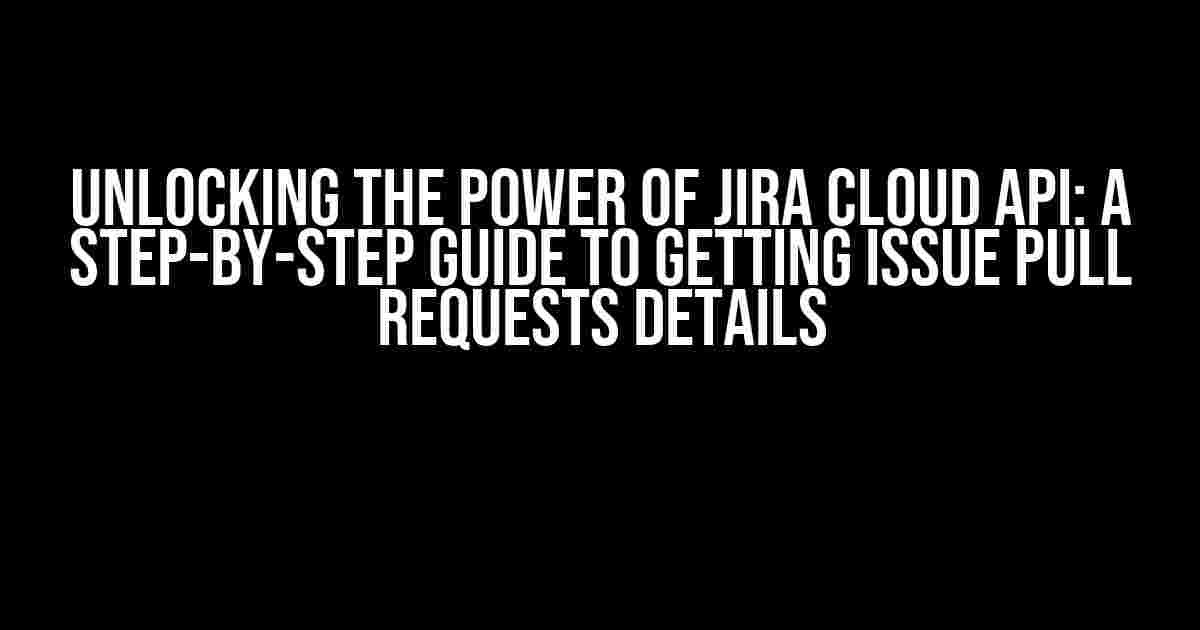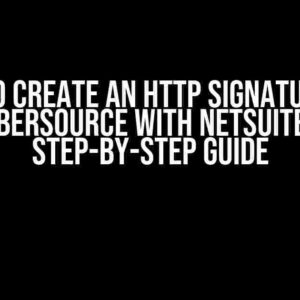Are you tired of manually searching for issue pull requests details in Jira? Do you want to automate the process and get the information you need quickly and efficiently? Look no further! In this article, we’ll explore the Jira Cloud API and show you how to get issue pull requests details like ID and URL using API calls.
What is Jira Cloud API?
Jira Cloud API is a RESTful API that allows developers to access and manipulate Jira data programmatically. With the API, you can create, read, update, and delete data in Jira, including issue pull requests. The API is built on top of the Jira platform and provides a secure and scalable way to interact with Jira data.
Why Use Jira Cloud API for Getting Issue Pull Requests Details?
There are several reasons why you should use the Jira Cloud API for getting issue pull requests details:
- Faster and more efficient: Using the API eliminates the need for manual searching and filtering, saving you time and effort.
- Automated processes: You can automate the process of getting issue pull requests details, making it easier to integrate with other systems and tools.
- Scalability: The API can handle large amounts of data, making it ideal for large-scale Jira implementations.
- Security: The API provides a secure way to access Jira data, ensuring that sensitive information is protected.
Prerequisites
Before we dive into the tutorial, make sure you have the following:
- A Jira Cloud instance with API access enabled
- A Jira API token or OAuth credentials
- A programming language of your choice (e.g., Python, Java, Node.js)
- A REST client or API testing tool (e.g., Postman, cURL)
Step 1: Authenticate with the Jira Cloud API
To use the Jira Cloud API, you need to authenticate with your Jira instance using a API token or OAuth credentials. Here’s an example of how to authenticate using Python:
import requests
api_token = "your_api_token"
base_url = "https://your_jira_instance.atlassian.net/rest/api/3/"
headers = {
"Authorization": f"Bearer {api_token}",
"Content-Type": "application/json"
}
response = requests.get(base_url + "issue/PRJ-1", headers=headers)
if response.status_code == 200:
print("Authenticated successfully!")
else:
print("Authentication failed!")
Step 2: Get Issue Pull Requests Details
Once authenticated, you can use the Jira Cloud API to get issue pull requests details. Here’s an example of how to do it:
import requests
api_token = "your_api_token"
base_url = "https://your_jira_instance.atlassian.net/rest/api/3/"
headers = {
"Authorization": f"Bearer {api_token}",
"Content-Type": "application/json"
}
issue_key = "PRJ-1"
pull_request_endpoint = f"issue/{issue_key}/pullRequests"
response = requests.get(base_url + pull_request_endpoint, headers=headers)
if response.status_code == 200:
pull_requests = response.json()
for pull_request in pull_requests:
print(f"ID: {pull_request['id']}, URL: {pull_request['url']}")
else:
print("Failed to get pull requests!")
Understanding the Response
The response from the API call will contain a list of pull requests associated with the issue. Each pull request object will contain the following properties:
| Property | Description |
|---|---|
| id | The unique ID of the pull request |
| url | The URL of the pull request |
| title | The title of the pull request |
| description | The description of the pull request |
| state | The state of the pull request (e.g., OPEN, MERGED, DECLINED) |
Common Scenarios and Use Cases
Here are some common scenarios and use cases for getting issue pull requests details using the Jira Cloud API:
- Automated testing: Use the API to get pull requests details and automate testing of your Jira implementation.
- Integration with CI/CD pipelines: Integrate the API with your CI/CD pipelines to automate the build and deployment process.
- Custom reporting: Use the API to get pull requests details and create custom reports to analyze and visualize Jira data.
- Scripting and automation: Use the API to automate repetitive tasks and workflows in Jira.
Conclusion
In this article, we’ve shown you how to use the Jira Cloud API to get issue pull requests details like ID and URL. With this knowledge, you can automate processes, integrate with other systems, and create custom reports and dashboards. Remember to authenticate with the API, use the correct endpoint, and parse the response to get the data you need. Happy coding!
For more information on the Jira Cloud API, please refer to the official documentation. If you have any questions or need further assistance, feel free to ask in the comments below.
Frequently Asked Question
Get ready to dive into the world of Jira Cloud API and uncover the secrets of retrieving issue pull requests details!
What is the Jira Cloud API endpoint to retrieve issue pull requests details?
The Jira Cloud API endpoint to retrieve issue pull requests details is `/rest/devinfo/0/issue/{issueIdOrKey}/pull-requests`. Replace `{issueIdOrKey}` with the actual issue ID or key.
How do I authenticate with the Jira Cloud API to retrieve issue pull requests details?
You can authenticate with the Jira Cloud API using Basic Auth, OAuth, or JWT. For Basic Auth, use your Jira username and password. For OAuth and JWT, follow the official Jira documentation for setup and authentication.
What is the response format of the Jira Cloud API endpoint for retrieving issue pull requests details?
The response format of the Jira Cloud API endpoint is in JSON format, containing an array of pull request objects with properties like `id`, `url`, `title`, and more.
Can I filter the pull requests results based on specific criteria using the Jira Cloud API?
Yes, you can filter the pull requests results using query parameters like `start`, `limit`, `state`, and `repositoryId`. For example, `?start=0&limit=10&state=OPEN` to retrieve the first 10 open pull requests.
Is there a rate limit for the Jira Cloud API endpoint for retrieving issue pull requests details?
Yes, the Jira Cloud API has rate limits to prevent abuse and ensure performance. The rate limit for the pull requests endpoint is 50 requests per minute per user or 100 requests per minute per IP address. Be sure to check the official Jira documentation for the latest rate limit information.


